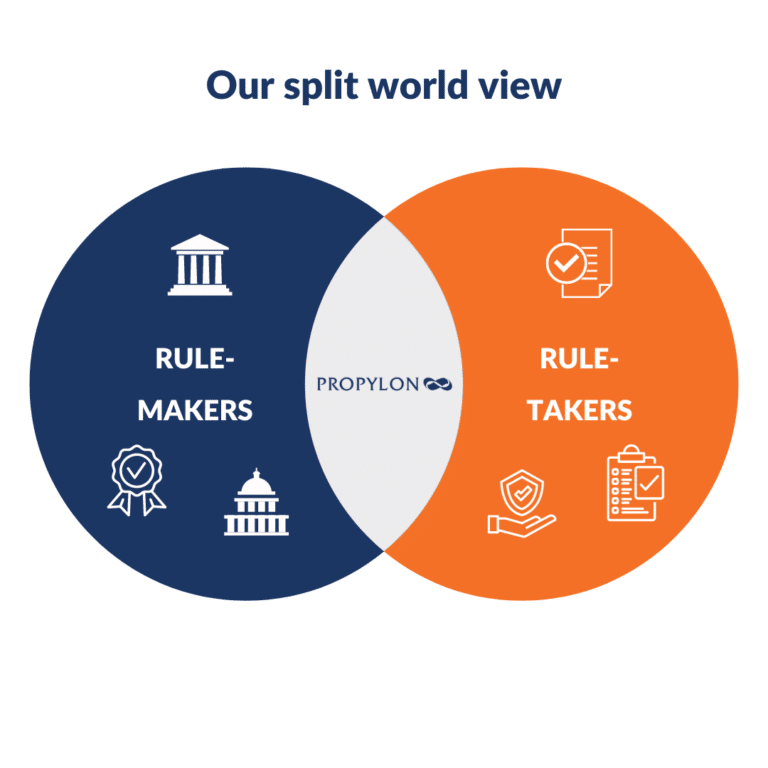The coming months look set to be dynamic. Times of uncertainty present both risks and opportunities. Indeed, according to Forrester’s predictions for 2023, 80 percent of companies will be pivoting innovation efforts from creativity to resilience, with predictions that technology executives will focus on initiatives that modernize business processes, automation, supply risk management, and employee experience.
At Propylon®, our vision is to disrupt the legal and regulatory publishing landscape with innovative solutions that simplify the complex and connect people with the law. Disruption is, for many, synonymous with the kind of approach to innovation that “moves fast and breaks things”, however, disruption for us is in the potential for technology to challenge the status quo and change working lives for the better.
As we meet the new year, we are reflecting on the learnings accrued in our 24 years in business with the last five trending steadily upwards. We are increasing our headcount, strengthening relationships with clients and partners, and expanding into new verticals.
Our three-to-five-year horizon is mapped by paths to sustainable growth. For us, that means partnering with customers with whom we can build long-term relationships and create long-term value, transforming how they do their jobs and carry out their business. Our technology solutions are developed to deliver core business value for legal, regulatory and standards change – an area in which over the past two decades, we have built in-depth expertise. The impact to business of this change continues to grow and our solutions are built to deliver long-term value to support the management of change in an efficient manner.

Rule-makers and rule-takers
We split the world in two: rule-makers and rule-takers. Rule-makers include creators of laws, regulations, and standards – essentially, the governing and non-governing bodies that create the rules that individuals, business and society must follow.
Recent years have seen an ongoing expansion of the volume and complexity of rules. This is not a trend that is simplifying but rather one that will continue to develop into the future as society tackles issues such as emerging technologies, board diversity, reporting transparency and sustainability. As such, the drafting, amending and publishing of rules becomes more complicated as laws, regulations and standards are layered, amended and subjected to constant review.
However, rulemaking is a domain that still operates in a book publishing mentality whereby books or electronic books (i.e., the PDF) are ultimately the endpoint. The creation process involves a high level of complexity; however, the end-user often does not derive the true value due to the effort involved in extracting it.
The impact to business of legal, regulatory and standards change continues to grow and our solutions are built to deliver long-term value to support the management of change in an efficient manner.
Complexity is increasing for the rule-takers also. Firms operating in heavily regulated industries – e.g. audit and accounting, tax law, healthcare – are drowning in a gargantuan task: rolling out updates from the rule-makers across the entire body of content that impacts its business framework. The sheer effort of the processes involved in keeping up with constant updates, and ensuring that staff are accessing and adopting material, ultimately eats into a firm’s competitive advantage.
Review occurs typically once a year however, there is a chance that an update happened six months previously. On the one hand, at the end of a review process, the key takeaway might be that no action is required. On the other hand, not only can incorporating updates lead to issues such as inconsistencies, version control, and a duplication of efforts, there is also risk of non-compliance if something is missed. If there is an event, how can firms prove that they were compliant at that time?
In addition, today’s research mindset is no longer geared towards the book and indeed, is increasingly moving away from it. Digital natives are maturing. Millennials are moving into management roles while Gen Z are now entering the workforce. Accustomed to the power of search and answers at the click of a button, they are less likely to learn the hierarchy of a table of contents, for example.
Technology presents opportunities to alleviate the burden of compliance, drive engagement with material and strengthen the relationships between rule-makers and rule-takers. Firms operating in heavily regulated industries do not want to be compelled to review everything but rather have the ability to access the most relevant material and take action as efficiently as possible.
Value creation for the long term
This is undoubtedly a time of change. Laws, regulations, and standards must still be refined and implemented by firms to govern how society and business functions – this is not a matter of choice. Regulatory change is neither transactional nor once-off. As such, the supports necessary for rule-makers and rule-takers must be built with an eye to the future.
Sustained business longevity is not maintained by growth at all costs. Propylon has grown incrementally as an organization and today, we have excellent clients and strong visibility on our pipeline. As we look towards the next decades, bringing value to our clients keeps us centered in our mission and vision of positive disruption.

